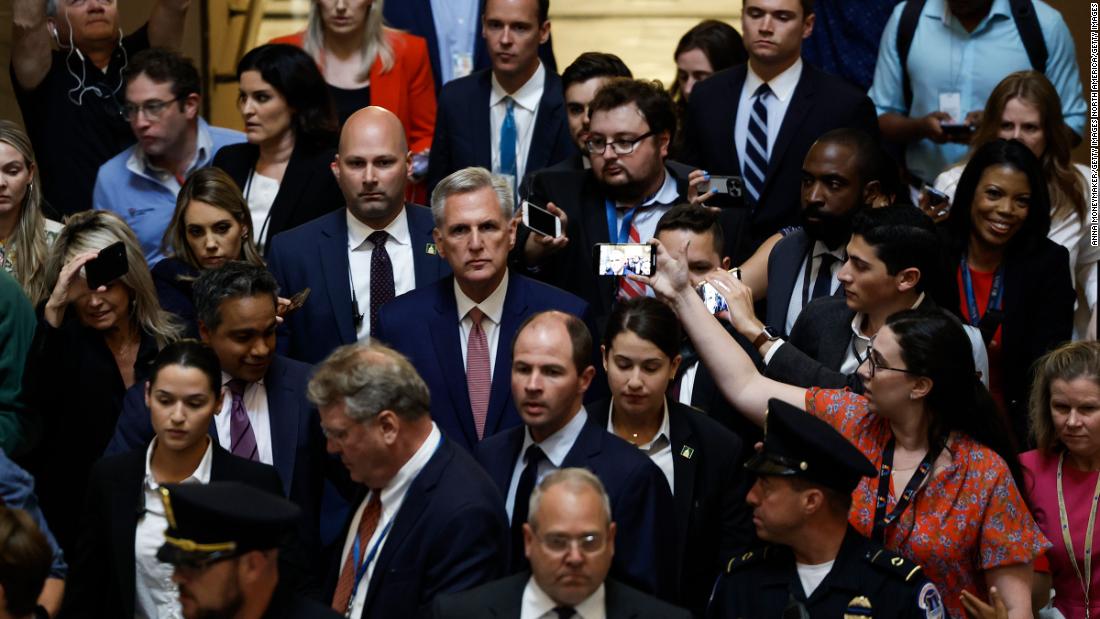- by foxnews
- 05 Apr 2025
A 'knockdown' fight: How the House and Senate are plowing ahead to a spending crisis this fall

The House and Senate are careening toward a major spending standoff that could consume Congress this fall, raise the threat of a government shutdown and once again test House Speaker Kevin McCarthy's ability to keep his narrow Republican majority behind him.
It's a showdown that was likely always going to come to a head eventually, but the hard-fought debt ceiling package signed into law earlier this month included a rare, early topline spending agreement that was carefully negotiated between the White House and the speaker that dictated how much money the federal government would invest in domestic and defense programs.
What followed, however, was a rebellion by the right flank of the GOP conference who argued the spending agreement wasn't low enough. The revolt led to a blockade of the House floor for a week and a call to bring spending back down to the previous fiscal year's levels.
On Monday night, House Appropriations Chairwoman Kay Granger, a Texas Republican, announced she would move all the bills through her House Appropriations Committee at the lower, fiscal year 2022 level.
"It is the law of the land and not even before the ink is dried, they walked away from it," the top Democrat on the House Appropriations Committee, Rep. Rosa DeLauro of Connecticut, said, adding the House GOP's decision was "chaos" and "all but guarantees a shutdown."
Republican argue a caps deal is a ceiling, not a floor and it's not a violation of the agreement to write spending bills that spend less than the number included in the debt ceiling proposal.
After all, they argue that Democrats and Republicans in the Senate wanted assurances from their leadership immediately after the House passed the debt bill that defense spending would be higher than the caps deal set out. Still, the posturing sets the stage for a messy and brutal spending brawl that will consume Congress this fall.
"You can always mark them lower," said GOP appropriator Rep. David Joyce of Ohio. "We just have to be realistic that the numbers that are going to come back here are probably not going to be at those 2022 levels."
Some GOP senators are already warning the tactic is going to be met with strong resistance in their chamber.
"The House likes to do things for messaging purposes," Utah Republican Sen. Mitt Romney said. "They infrequently reach the Senate but when they do, they have to pass with Republicans and Democrats, and so I would not give that a lot of prospect for success."
McCarthy has promised to restore so-called regular order in the House, assuring his members he'll move all 12 appropriations bills through the committee and onto the floor. That process will take weeks and with a slim majority will require leadership to operate with little room for error despite vast ideological differences within the GOP conference over how deep cuts in spending should be and what should be prioritized. A number of members of the House Freedom Caucus also serve on the Appropriations Committee laying bare the reality that the bills will likely need to have their backing to even make it to the House floor. And that is just one chamber. Whatever the House passes won't have a chance in the Democratic-controlled Senate forcing the two chambers into what could be a painstaking and arduous negotiation.
"We're gonna have a sit down, knockdown, drag out (fight) - we recognize that, but it is much better to have a full appropriations process than it is to have a continuing resolution," said Sen. Mike Rounds, a Republican from South Dakota.
Putting even more pressure on lawmakers to find an agreement is that one of the provisions included in the debt ceiling deal would force any continuing resolution - a backstop to avoid a shutdown - to fund the government at 2023 levels to be cut at 1% across the board beginning in January 2024. The actual cuts would then begin in April and include defense cuts that Republicans and Democrats alike have warned would be devastating to national security.
It's a series of compounding crises that seasoned appropriators are warning could become a major issue this fall and winter.
"I still think there is a prospect that we could be at an impasse come into September. We are going to get 12 bills out of committee. I would like to think we can get 12 bills through the House, but I am not making that prediction because we cannot agree," Republican Rep. Steve Womack of Arkansas said. "Come end of September, we are going to have a dilemma on our hands and the governing majority doesn't need to be toying around with shutting down government."
On Tuesday, House GOP leaders convened a meeting of the so-called five families, representatives from the conference's different ideological wings who discussed what the future of the spending negotiations would look like in the House. Multiple sources in the meeting told CNN there wasn't a clear resolution, but the conversation centered around how the GOP could try and score victories in the appropriations process and what some of those wins could look like. Inside the meeting, some members pushed the idea of using the appropriations process to defund plans to build a new FBI building, a move not all members are on board with. There was also a broader discussion of what policy riders might be included in their bills whether it be on immigration or other priorities.
"We have a conference who is all over the map on spending that we all would collectively like to spend less, but we all have different ways we would spend less," Womack said of the meeting.
The news of Granger's announcement late Monday traveled quickly among Senate appropriators, but it came as a major surprise to many.
Sen. Lisa Murkowski, an Alaska Republican who serves on the Appropriations Committee, described Granger's announcement as "unsettling."
"I think it certainly makes things much, much more complicated," Murkowski said. "I, as an appropriator, did not get a heads up that this was coming our way."
Maine Sen. Susan Collins, the top Republican on the committee, downplayed the significance of the House's effort to mark up their bill at lower levels, arguing eventually it will be worked out.
"The House will make its own decisions. It will not affect how we proceed in the Senate," Collins said. "Eventually, we will have to get together in what I hope will be a conference committee and work out the differences."
Asked if this raised the prospects of a shutdown, Collins said, "It doesn't have to mean that at all."
Senate appropriators plan to move their bills at the spending levels that were agreed to by the White House and Republicans in the debt ceiling agreement, warning that ultimately those numbers are the only thing that can pass both chambers and be signed by the president.
"I think the agreement will ultimately stand the test of time because I think the Senate will insist on making it happen," Sen. Chris Van Hollen, a Maryland Democrat on the committee, said.
Between now and October 1, Congress is in session for a total of 42 legislative days. The House and Senate overlap in session just 17 days before October. It's a tight turnaround and for a process that Congress hasn't successfully executed in more than two decades.
"We'll figure it out," Senate Republican Whip John Thune said.
CNN's Nicky Robertson contributed to this report.
- by foxnews
- descember 09, 2016
Excavation near site where Jesus was crucified and buried results in ancient discovery
Proof of ancient olive trees and grapevines, consistent with a Bible verse, has been found at the Church of the Holy Sepulchre in Jerusalem, an archaeologist confirms.
read more


